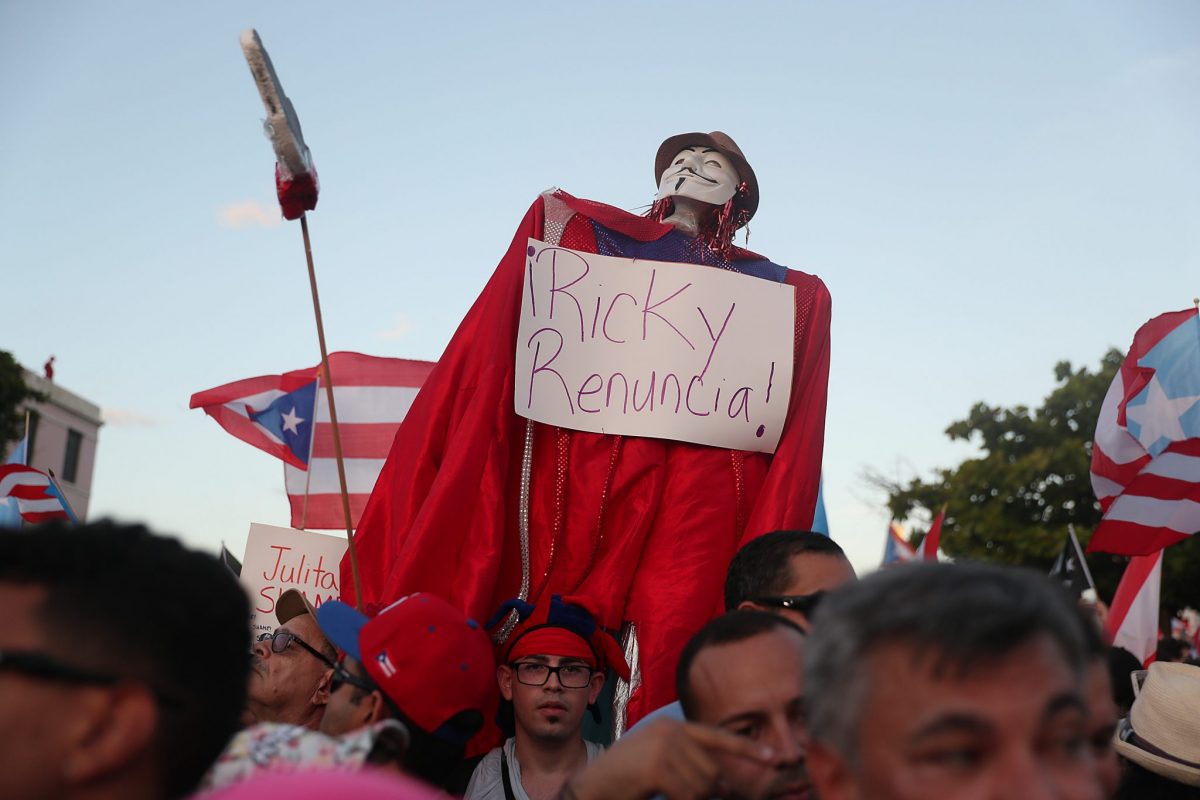

Demonstrators protest against Ricardo Rosselló on July 17, 2019 in Old San Juan, Puerto Rico. (Photo by Joe Raedle/Getty Images)
Puerto Ricans on the island and in the diaspora are marching in several cities, demanding the resignation of Puerto Rico Governor Ricardo Rosselló. A nearly 900-page Telegram document was leaked recently, exposing hundreds of online chats shared by the governor and members of his cabinet. Revealed was the truest face of his administration’s corruption at its ugliest and worst; sexist insults and violent commentary were directed at female politicians such as San Juan Mayor Carmen Yulín-Cruz and former New York City Council Speaker Melissa Mark-Viverito—some of his fiercest and most vocal opponents. Homophobic barbs were even hurled at pop singer and entertainer Ricky Martin, but this isn’t even the worst of it.
While mainstream news thrives on celebrity, the blatant disrespect directed at those who perished during and after Hurricane María struck in September 2017 —a catastrophic humanitarian crisis— was the absolute lowest. The governor and his colleagues poked fun at corpses piling up in morgues due to a shortage of pathologists, while hundreds of thousands of Puerto Ricans fought to survive without electricity, shelter, water, and food in many cases. His and his administration’s lack of compassion for its own people cannot be forgiven, especially on the heels of such a disastrous event as Hurricane María. The storm tore through the islands during a crippling and controversial fiscal crisis and hundreds of public schools have been closed since. The administration’s alleged misuse of recovery funds only adds to this abuse.
What makes this worse was how Puerto Ricans came together as a people during the crisis that followed the hurricane, in ways I’ve never seen before. Boricuas from the island and the diaspora collaborated on innovative and healing initiatives as a massive exodus of islanders arrived on the mainland seeking safer living conditions. Many who fled left everything behind and were received and welcomed by organizations and individuals who helped however they could. Mainstream recording artists teamed up and released songs that raised millions of dollars to date, in the shadow of the Trump administration’s racist, cat-and-mouse politics. It was in the Puerto Rican arts and culture community that new visions of what was possible began to emerge.
The Northern Manhattan Arts Alliance (NoMAA) organized a screening of the chilling documentary Puerto Rico: Hope in the Dark, at the Sugar Hill Children’s Museum—almost a year after the hurricane. The 47-minute film was produced and edited by Pace University students in response to the devastation; eighteen film and media students and their administrators traveled to Puerto Rico six months after the storm hit, to compile testimonials and interviews in multiple municipalities. Also presenting to a full house that day were Arnaldo J. López of Pregones/Puerto Rican Traveling Theater, the Reverend Damaris Whittaker and Sabas Whittaker of Ft. Washington Collegiate Church, and Mónica Tavares of Hispanic Federation. Each panelist discussed their organization’s contribution to recovery efforts and encouraged attendees to take action however possible. Watch it here:
Brooklyn-based artist Edgardo Miranda-Rodríguez mobilized his graphic novel superheroine, La Borinqueña, to inform younger audiences and genre fans about the issues facing Puerto Rico. His Somos Arte media company published the anthology Ricanstruction: Reminiscing and Rebuilding Puerto Rico in 2018, which features a long list of artistic talent from the community such as Esmeralda Santiago, Sandra Guzmán, Lemon Andersen, and Gabby Rivera. This collection educates audiences while redistributing proceeds to struggling arts and culture nonprofits on the island. The anthology provided the perfect space for imagining alternate futures for Puerto Rico in the wake of disaster and has raised over $250,000 to date, another example of community-based action through artistic production and consumption. For more info see: la-borinquena.com.
Raquel Salas Rivera, Poet Laureate of Philadelphia, published a collection addressing the crisis and troubles following Hurricane María. Their latest offering, while they sleep (under the bed is another country), “was written in dialogic fragments and interspersed with prose poems reflecting on the lasting impact of colonial trauma.” The poems vividly illustrate the displacement, alienation, and terror following the devastation, like nothing I’ve yet to read. Shorter pieces such as “that time we existed/because we were dying” and “she died/her body in the house/for weeks” maximize the power of minimalism, evoking instant and horrific impressions of tragedy and suffering. Learn more about Raquel: raquelsalasrivera.com.
The refrain “Despierta Boricua” is deeply-entrenched in our culture; those of us who grew up with independence-leaning family members are clear about this. It appears in the songs of popular musicians such as Eddie Palmieri, Henry Fiol and countless others, as a call for the people to rise and take action. Puerto Ricans may be divided by geography, politics, and language but certain lines should never to be crossed: This is the crossroads we’re standing at. The dead are never to be disrespected. Especially during a time when many who survived Hurricane María wonder about those who didn’t, those who died alone—those who’ve taken their lives since. Puerto Ricans are taking to the streets to demand the resignation of Puerto Rico Governor Ricardo Rosselló and we have every reason. Con los muertos no se juega…
#RickyRenuncia
***
Charlie Vázquez is an arts and culture consultant with over thirty years’ experience in the cultural sector, as an author, musician, fundraiser, festival planner, technology strategist, exhibit developer, and communications coordinator. You can contact him through LinkedIn.


